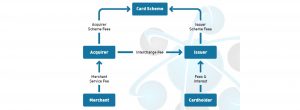Merchant Service Fees – Lean in and Learn

Author: Robert Roylance, Associate, Payments Consulting Network, Sydney
Did you know Merchants can negotiate their cost of Merchant Service Fees (MSF) to improve their profit margins? This may be a very big surprise to the many thousands of merchants around Australia who have accepted the percentage buried somewhere in a contract.
The MSF may be a ‘blended’ rate or it may be an ‘interchange plus’ or a ‘cost plus’ rate, depending upon the preference and circumstances of the particular merchant.
Merchant Service Fees are paid by a merchant to their Acquirer in exchange for having payment cards issued by Visa, Mastercard, eftpos and other schemes, accepted and processed according to the rules of the scheme. The Acquirer must be an acquiring member of each scheme in order to offer acquiring services to merchants. The merchant and the Acquirer negotiate and execute a Merchant Agreement which specifies terms, conditions and prices.
The Acquirer pays Interchange Fees (see earlier article here) to the Issuer and also pays Scheme Fees to the relevant card scheme. Credit card interchange fees are priced as a percentage of the transaction value, whereas debit card interchange fees are priced as a fixed number of cents per transaction for Card Present and a percentage for Card Not Present (e-commerce and telephone) transactions.

There are a wide range of interchange prices set by the schemes for different types of cards, merchant segments and acceptance conditions. As an example, Visa currently has 22 different interchange rates for Australian issued credit cards.
For this reason, many smaller merchants prefer to have a ‘blended’ MSF, with all Visa and Mastercard transactions having the same MSF to make reconciliation simpler for the merchant. For merchants with low volumes of transactions and not wishing to spend time on administration, a blended rate MSF may be the best choice.
For some merchants however, it will make sense to consider either ‘interchange plus’ or ‘cost plus’ MSF rates. These rates are based upon the merchant agreeing to reimburse the Acquirer for their cost of interchange plus a margin (interchange plus) or, alternatively to reimburse the Acquirer for their cost of interchange and Scheme Fees plus a margin (cost plus).
This type of MSF pricing gives the merchant more visibility of their card mix and the interchange fees they are paying and more transparency of the margin being earned by the Acquirer. The negotiated margin may be a fixed amount of cents per transaction or maybe a percentage depending upon the merchant’s payments mix.
The merchant may also consider a tiered margin that declines progressively as payment transaction volumes increase over time. This is more appropriate for Merchant Agreements that apply for three to five years, where inflation may be a factor to include in the model.
Payments Consulting Network can assist merchants who may wish to have expert support during the modelling and negotiation process.




